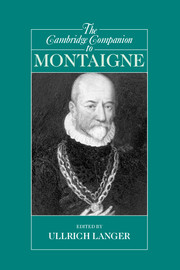Book contents
- Frontmatter
- 1 Introduction
- 2 Montaigne’s political and religious context
- 3 Montaigne’s legacy
- 4 Montaigne and antiquity
- 5 The Essays and the New World
- 6 Justice and the lawlaw: on the reverse side of the Essays
- 7 Montaigne and the notion of prudence
- 8 Montaigne and the truth of the schools
- 9 The investigation of nature
- 10 Montaigne and skepticism
- 11 Montaigne on moral philosophy and the good life
- Bibliography
- Index
9 - The investigation of nature
Published online by Cambridge University Press: 28 May 2006
- Frontmatter
- 1 Introduction
- 2 Montaigne’s political and religious context
- 3 Montaigne’s legacy
- 4 Montaigne and antiquity
- 5 The Essays and the New World
- 6 Justice and the lawlaw: on the reverse side of the Essays
- 7 Montaigne and the notion of prudence
- 8 Montaigne and the truth of the schools
- 9 The investigation of nature
- 10 Montaigne and skepticism
- 11 Montaigne on moral philosophy and the good life
- Bibliography
- Index
Summary
We have our philosophical persons to make modern and familiar,
Things supernatural and causeless.
Shakespeare, All’s Well that Ends Well (11.3.2–3)Loath to identify himself with any school of thought (he never even directly called himself a skeptic), Montaigne nonetheless does name himself a “naturalist”: “We naturalists judge that the honor of invention is greatly and incomparably preferable to the honor of quotation” (iii.12, F809, V1056C). Used in a literary instead of a philosophic context, as well as somewhat off-handedly, the label would nevertheless have sent a specific signal to readers. Today, the term applies capaciously to a diverse array of scholars working within what can be described as a pre-scientific mentality, most notably empirical medical practitioners such as Ambroise Paré (1510-1590) and observers of flora and fauna such as Pierre Belon (1517-1564) and Guillaume Rondelet (1507-1566). But Montaigne's peers used it more pointedly to designate the attempt to explain phenomena without recourse to divine causation, or “first causes.” Naturalism, in brief, entailed a search for secondary causes.
- Type
- Chapter
- Information
- The Cambridge Companion to Montaigne , pp. 163 - 182Publisher: Cambridge University PressPrint publication year: 2005
- 3
- Cited by



